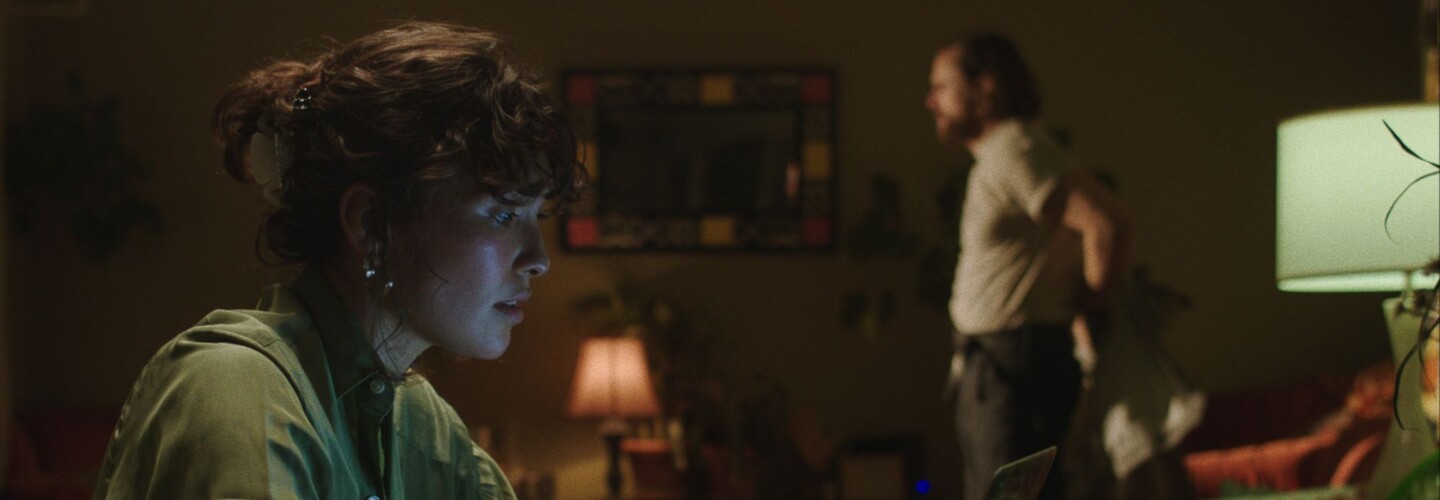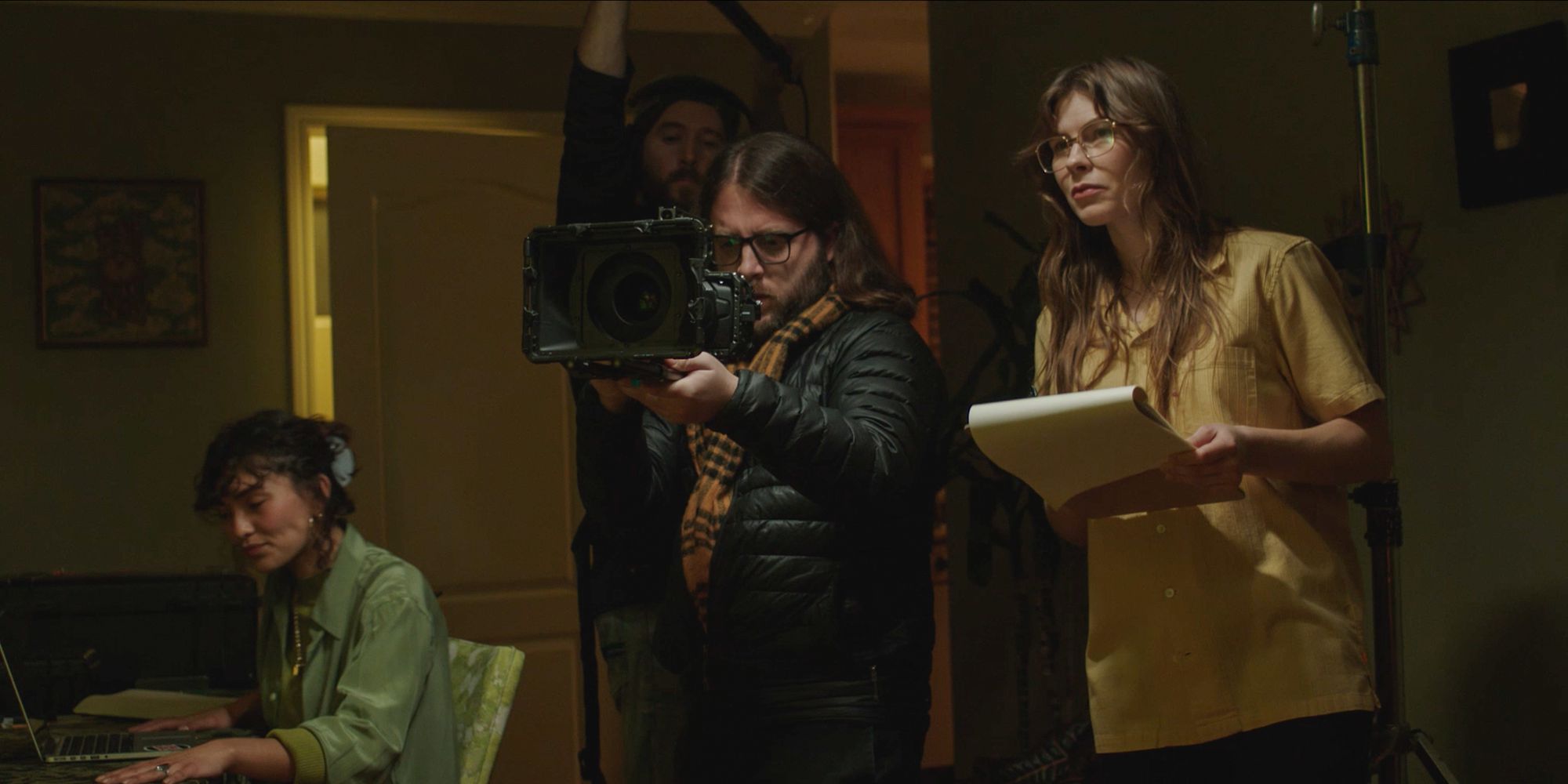
If a film was introduced to you as an exploration into toxic masculinity born of narcissistic behaviours within the indie film world you’d likely have an expectation of what to expect across its 15 minute runtime. However, throw into that assumption a meta-narrative which spans four different inter-connected realities, all suffused with a darkly satirical take on the self-important ‘genius’ indie filmmaker and you’ll arrived at Mitch deQuilettes’ sardonic comedy Staff Pick. A film that uses both its content and structure (along with its on-point title) to hold up a mirror to the self-absorbed personalities which beleaguer the creative process, DN spoke to deQuilettes about self-referential filmmaking and why satire should always be approached from an earnest perspective.
How did this meta, multi-reality jumping idea come into being?
I’ve been close friends with my co-writer Chasen Bauer for about ten years now, and we’ve always wanted to write something together. He comes from the underground theater world, which is nice to be around creatively. We bond hard through the art of story. One night, over a quarantine bubble hang, Chasen had a great plot idea about scenes continuously cutting out from other scenes, and the worlds becoming more real, more meta. I then suggested that we make the themes revolve around toxic masculinity and the indie film world. We hacked out the script in a few weeks and shot a couple of months later.
I’m a huge planner so I can play creative jazz on set. I spent a lot of time thinking about how I wanted the visual, emotional, and character arcs to translate. How they would all meld together, interconnecting through four realities. I felt that I needed to make the worlds different but not too different because the ideas were coming from the same two female writer’s minds. But hey, that wouldn’t be revealed until later. That was one of the last plot twists. So I worked backwards and mapped out how each actor would tonally perform in each section of the film. It was a really fun puzzle to figure out.
I spent a lot of time thinking about how I wanted the visual, emotional, and character arcs to translate.
My directing style in an actor’s performance is something I’ve been attempting to develop for a while now. And a lot of the film’s tone was in the text, but that still needed to be translated to the screen. So for this piece to work, I knew that the cast had to be drawn from within my close friend community. Especially because we were making commentary on a certain ‘scene’, a certain genre of filmmaker. It took a couple months to put the right talented batch together. But once this fell into place, the project sort of took off. We shot the short in four days and released it one month later. We were able to turn this around so quickly because I was the editor and sound mixer too.
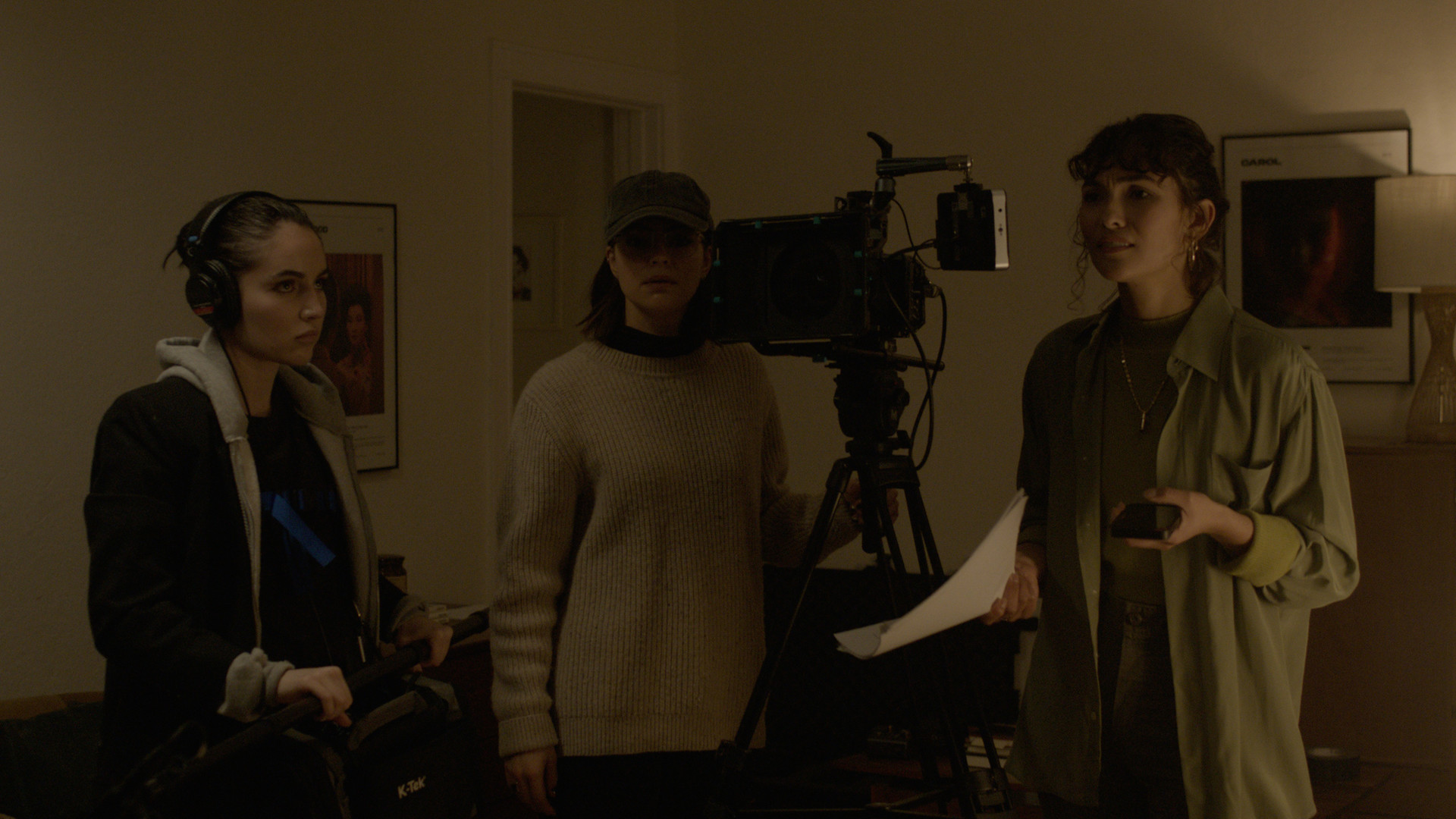
It is easy to see how you could fall down the rabbit hole and just keep going with the scene within the scene reveals. How did you decide that four realities was the right cutoff point?
It’s funny you say that. We were actually thinking about adding one last layer where Rhett, our male antagonist, would be tripping out on mushrooms in his bedroom babbling ideas to himself in his underwear, frantically typing at his laptop. We decided that this wasn’t the tone to end our film on though. It would have given the entire piece a darker, more morbid resolution instead of a light, comedic exit. Also, four realities play much better structurally; Act 1, Act 2, Climax, and Resolution. This felt like the right move for a 15 minute run time. It would give each section just enough time to develop plot, theme, and character while keeping a fast pace to sustain attention.
What about the indie filmmaking world do you think lends itself to this type of film?
Filmmakers are very self-aware beings. We have to be very introspective to make our art. We are constantly critiquing ourselves, our personal ‘branding’, our relationships, our existence. It can all get very self-serious. So, to create an effective narrative around this topic, we have the characters in our film discussing the validity of their art and how it affects them, while continuously pulling out of film scenes, while our audience is watching a movie about making movies. This combination creates a strange vortex for comedy, and I think this is where the meta aspect really works because the filmmaker is creating a fictional reality, while simultaneously living an insecure existence.
I wanted to put a microscope on a certain personality type that has become toxic for our creative communities.
There’s a lot of pressure to become a ‘great’ filmmaker these days. Competition is higher than ever and we’re constantly yearning for affirmation amongst respected peers. With our short, I wanted to put a microscope on a certain personality type that has become toxic for our creative communities. That’s why we revolved our short around a male director who doesn’t want to listen to his collaborators, friends, or loved ones. A character who believes that they are the chosen one, and will use manipulative tactics to always have the upper hand. Even if they are unaware of their motives or not, it’s still toxic. This is a person I’ve bumped into often throughout the years.
I think deep down this flaw comes from the male’s provider mentality. That us men must prove our worth by being the leader, the spreader of knowledge. It’s an archaic thought pattern but it’s ingrained in our genetics via centuries of societal training. It consciously or subconsciously courses through our monkey man systems and ultimately, this type of attitude needs to be eradicated.
In our short Rhett is on the cusp of change, but becomes caught up in his own ego and that’s his downfall. He knows he needs to be more ‘woke’, more progressive, but his actions don’t match his words. He keeps getting in his own way because he doesn’t know how to give up power and I think this is where a lot of males are at right now. They know what they need to do, but they don’t know how to give up the reigns because if they surrender, where does their universal value lie?
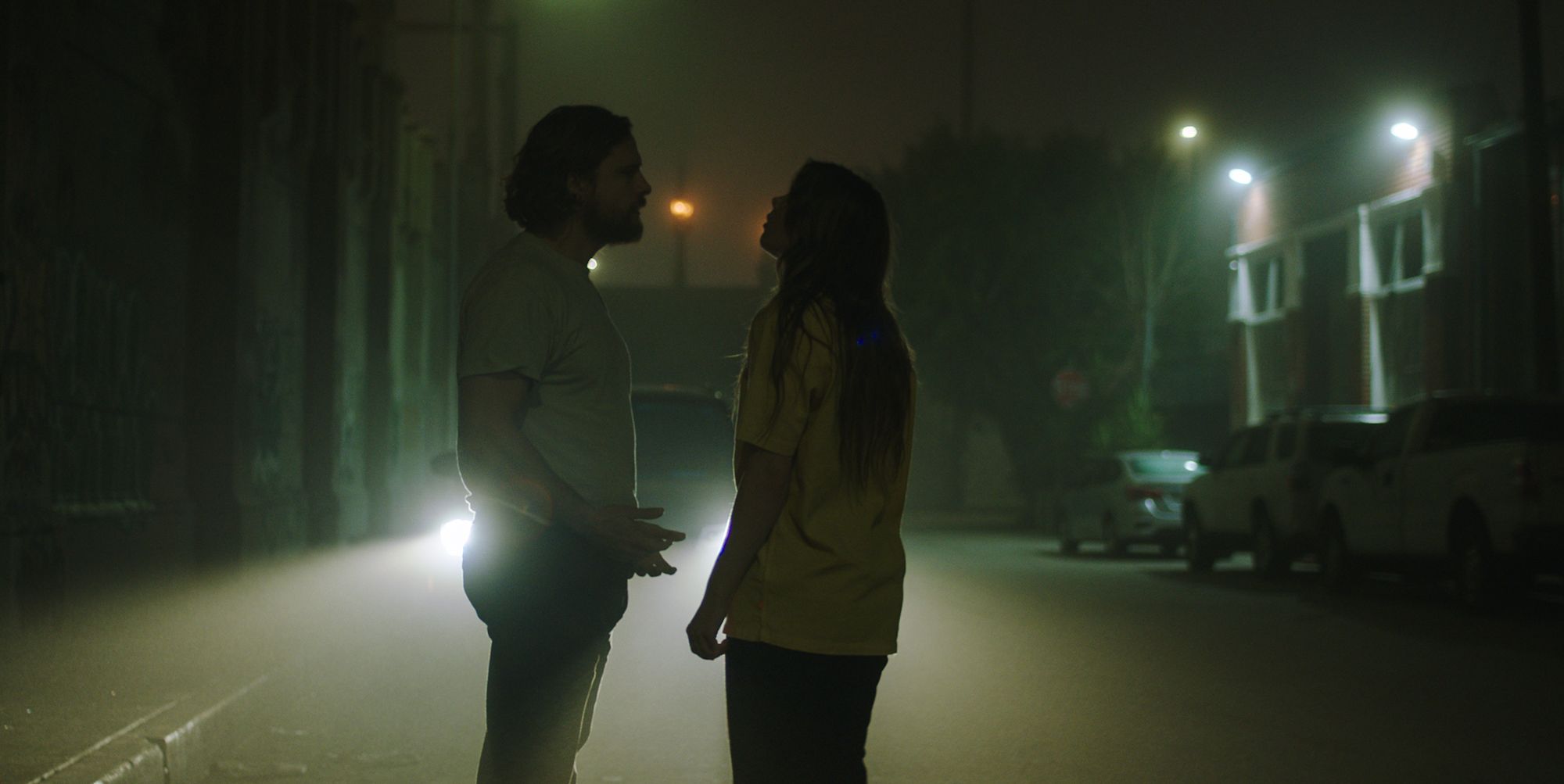
As you mentioned, the character arcs are integral to the concept, how did the actors you put together bounce off each other to create what you visualised?
We did one 5 hour Zoom session prior where we fully rehearsed the scenes and delved deep into character motivations. We then allowed 6-8 hours of shooting per scene on the production days so the cast didn’t feel rushed. We would rehearse extensively on set prior, and then shoot the scene over and over again until we got it right. Not because it wasn’t working, but because there was the possibility of making the scene even better. This gave a ton of room for the actors to play, and get into the veins of their characters. And honestly give them room to experiment. To go bigger, or smaller. To discover new moments in the moment.
Our main vision was that every time the story entered a new reality, the performances would become less melodramatic and more grounded, or more ‘real’. But Rhett’s character arc would do the opposite. It would devolve from a sensitive, open-minded modern male to a passive, egocentric unaware ‘art boi’. With this overarching note to talent, we believed the cast would have a lot to play with.
Howd did you use the film’s cinematography to both differentiate the scenes and still have Staff Pick feel like a cohesive piece?
We wanted to make each section feel different, while simultaneously having them flow into each other. Scott Siracusano, the cinematographer, put a lot of work into finding the right look for each reality. It was important that the aesthetics weren’t too dynamic but instead subtle. He wanted to approach each day as an open canvas, it was important that we didn’t control our expectation of the scene too much. That we’d go into every scene with no rules. He exposed the scenes with the intention of building most of our look in camera, while simultaneously shooting everything in a 2:1 aspect ratio on an Arri Classic and Black Magic 6k to give us the ability to bend any scene into any ratio we wanted to later on. This was truly low budget, Scott was pulling his own focus and lit everything with just two lights. But instead of us seeing this as a weakness, we used the limited resources to our advantage.
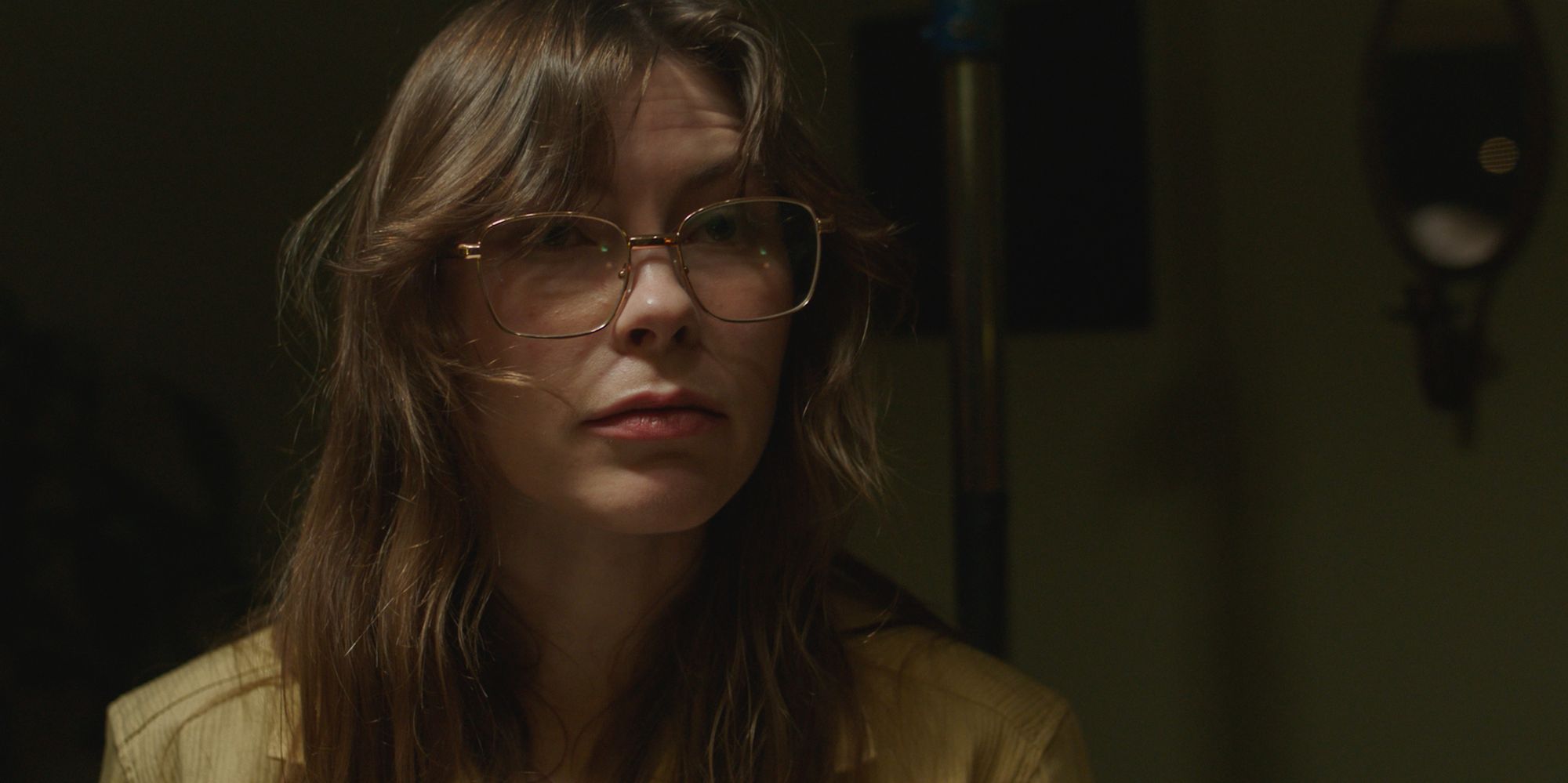
Please tell us more about working with your composer, what direction did you give him and how did he run with it?
To add a final layer, I knew I had to throw one last sprinkle of cinematic satire into the overall tone of the film to really fuse it all together. That’s where the composer, Michael James Lee came in. He made everything purposefully melodramatic so the audience would hopefully feel like they were in a moment of ‘cinema’ right before the veil was lifted into the next reality.
Michael kind of does his own thing, which I like. Our creative tastes are very aligned so there usually isn’t much to discuss. I requested that the score needed to separate the four worlds but also fuse them together. I also wanted him to lean towards an eerie melodramatic tone, which would help elevate the satire. With that little bit of information, he spawned the limited, but enthralling score that lives inside our film now. This is why I love collaboration. Overall I want to have very little control. I just want to say my two cents and let my collaborators play. It’s all in the curation of the team. I’m a big believer in this philosophy.
Were you at all worried about the reception of Staff Pick considering its potential audience is likely filled with the same self-important individuals the film takes a swipe at?
I wasn’t worried at all honestly. I was always taught by my mentors that great satire is told by holding a mirror up to the audience, allowing them to laugh at themselves or relatable situations. And through laughing together, we can become better people by seeing the flaws. That’s why memes work so well. I think satire turns inappropriate when the storyteller hasn’t lived or experienced what they’re telling. When they are apathetically observing from a distance instead of feeling the actual experience. All four of these realities from Staff Pick are situations that Chasen or I have been through, felt, or experienced.
I think satire turns inappropriate when the storyteller hasn’t lived or experienced what they’re telling.
For example, the two female characters at the end of our film are proxies for a type of conversation that we have both overheard or lived through. Two angry people, man or woman, venting about their ex-lovers and how they should write about it but never actually start because they decide to get fucked up instead. This is a common conversation. It’s relatable. I’ve had this conversation at a certain point in my life where I’ve chosen the bottle instead of the pen.

We then took this modern archetype and bent it towards the theme of our story. Two female writers questioning if it’s worth their time to make another film about a narcissistic ex-lover. This is a trending story arc right now in cinema. Stories about female protagonists taking down the patriarchy. There’s no doubt about that. We’re not mocking it. We’re holding up a mirror for the audience, allowing them to question their values on the situation. I would say I’m always pro any content against toxic masculinity but either way, this is a popular topic and rightfully so. I thought it would be interesting to make commentary on how creatives follow certain trending themes to build their filmmaking careers. So, because all our scenes bleed true to life because the satirizing came from an earnest angle… I wasn’t worried about the content being offensive. It’s relatable.
What is next for you?
I’m currently trying to get a one season miniseries off the ground. It’s a dystopian satire with themes revolving around the current housing crisis, and capitalism within government. I can’t say much else about it but that’s my main focus right now. In the meantime, I’ll be hopefully making another short film soon and working on my craft through music videos in between. Gotta keep on pushin’!

